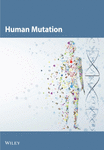Twenty-six novel EFNB1 mutations in familial and sporadic craniofrontonasal syndrome (CFNS)†
Communicated by Maria Rita Passos-Bueno
Abstract
Craniofrontonasal syndrome (CFNS) is an X-linked disorder characterized by a more severe manifestation in heterozygous females than in hemizygous males. Heterozygous females have craniofrontonasal dysplasia (CFND) and occasionally extracranial manifestations including midline defects and skeletal abnormalities, whereas hemizygous males show no or only mild features such as hypertelorism and rarely show cleft lip or palate. Mutations in the EFNB1 gene in Xq12 are responsible for familial and sporadic CFNS. The EFNB1 gene encodes ephrin-B1, a transmembrane ligand that also exhibits receptor-like effects. We performed mutation analysis in nine unrelated families and 29 sporadic patients with CFNS. DNA sequencing revealed mutations in 33 (86.8%) cases including 26 distinct novel mutations. A recurrent nonsense mutation, c.196C>T/R66X, was detected in one family and four sporadic patients. The majority of mutations (26/33) were located in exons 2 and 3 of the EFNB1 gene encoding the extracellular ephrin domain. The mutation spectrum includes frameshift, nonsense, missense, and splice site mutations, with a predominance of frameshift and nonsense mutations resulting in premature truncation codons. For the first time we describe mutations in exons 4 and 5 of EFNB1. Of particular interest are the frameshift mutations located in the last 25 codons of EFNB1 encoding the carboxyterminal end of ephrin-B1. They result in an extension by 44 residues. These mutations disrupt the intracellular binding sites for Grb4 and PDZ-effector proteins involved in reverse signaling. We conclude that the major causes of familial as well as sporadic CFNS are loss of function mutations in the EFNB1 gene that comprise premature termination or abrogate receptor-ligand interaction, oligomerization, and ephrin-B1 reverse signaling. Hum Mutat 26(2), 1–6, 2005. © 2005 Wiley-Liss, Inc.




